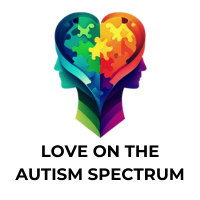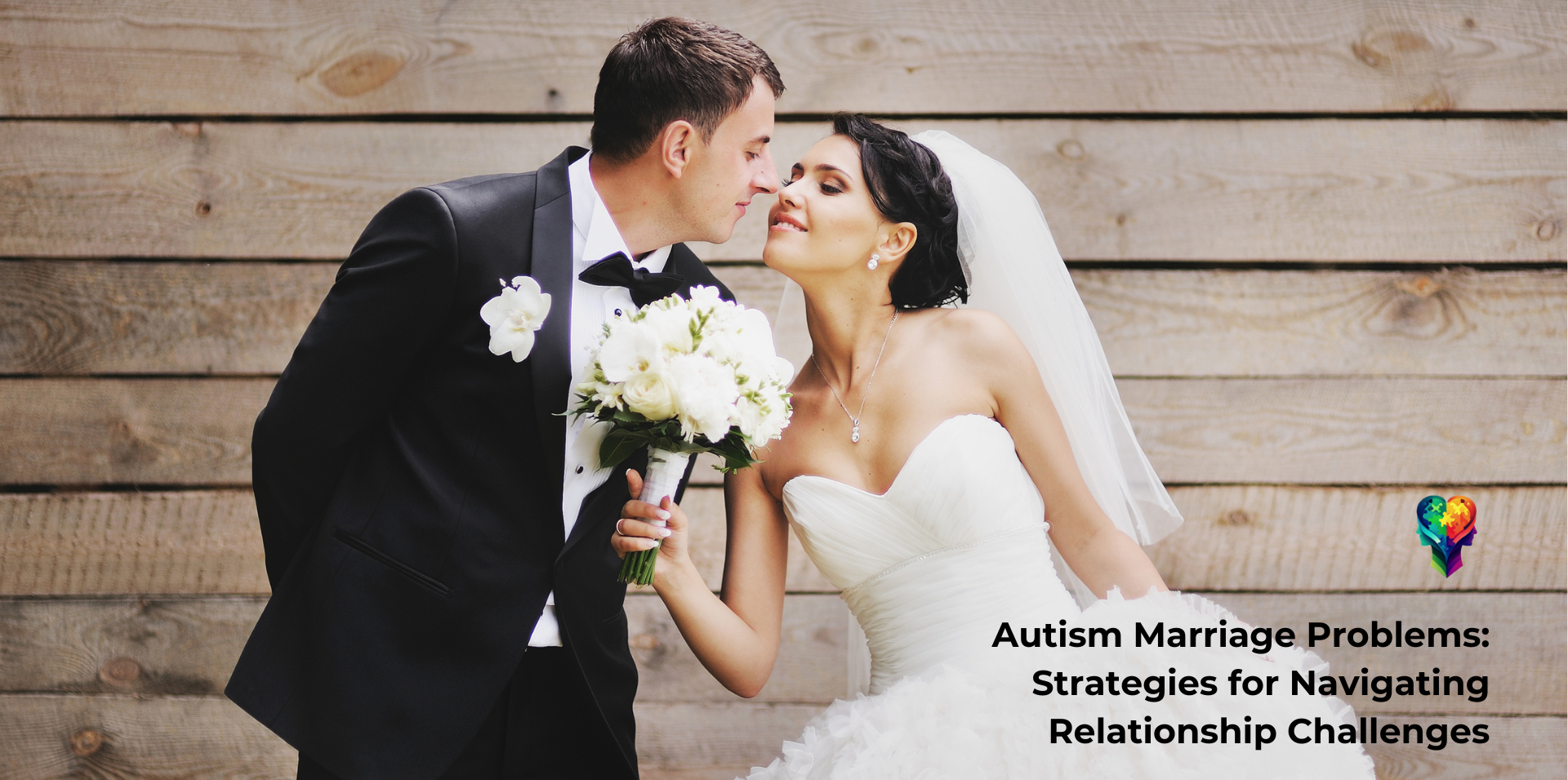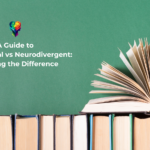A neurodiverse marriage, where one partner is on the autism spectrum, brings unique challenges and opportunities, often leading to autism marriage problems. Understanding and embracing these differences is essential for a solid and lasting bond. In this blog post, we’ll explore strategies for navigating relationship challenges, the impact of autism on intimate relationships, mental health issues, long-term relationship dynamics, and seeking support and resources to address autism marriage problems.
Key Takeaways
- Navigating Neurodiversity in Marriage requires self-awareness and communication strategies.
- Autism spectrum disorder can have a significant impact on intimate relationships, but open communication helps bridge gaps.
- Mental health issues, counseling, and support groups can help foster strong relationships between neurodiverse partners.
Navigating Neurodiversity in Marriage

Receiving an autism spectrum diagnosis (ASD) marks the initial step towards grasping the implications of autism spectrum disorder on a relationship. Many adults, especially young people, may be living with undiagnosed autism. A specialist can assist in recognizing adult ASD and streamline the diagnosis process. With a diagnosis, both partners can gain a better understanding of the husband’s brain and how autism affects their relationship.
In a neurodiverse marriage, communication styles can differ significantly. Autistic people tend to communicate transactionally, interpreting statements literally, while neurotypical individuals often communicate with more intricate nuances. This disparity may lead to misunderstandings and unintentional hurt; necessitating readjusted expectations and refined communication skills. Couples can work with an ASD-specific counselor or attend support groups to help accept each other’s strengths and weaknesses.
Recognizing how ASD characteristics influence a relationship can alleviate blame, frustration, shame, pain, and confusion experienced by one or both partners. For example, autistic people may have difficulty interpreting facial expressions, body language, and social cues. Developing self-awareness and understanding for both partners is vital for navigating these communication challenges.
In a neurodiverse relationship, it’s crucial to understand that one partner may struggle with:
- Emotional regulation
- Sensory overload
- Impulse control
- Social skills
- Anxiety and other mental health issues
By acknowledging these challenges, you and your partner can develop coping strategies and foster a supportive environment.
For a neurodiverse couple to be successful, both spouses must be dedicated to understanding what it means to be a neurodiverse couple and refrain from having unrealistic expectations. This commitment can lead to a deeper comprehension of each other’s capacities and a stronger bond in the long term.
The Impact of Autism on Intimate Relationships
Autism spectrum disorder can significantly impact intimate relationships, particularly in communication, social skills, and sensory needs. An autistic person may have difficulty interpreting non-verbal communication, such as body language and facial expressions. They also tend to interpret words literally and process verbal communication more slowly.
Sensory issues can significantly affect those on the spectrum, as one or more senses may be overly sensitive or under-sensitive. This can create unique challenges in an intimate relationship, as sensory overload or sensitivities may influence daily activities and social interactions.
Clear and predictable communication is a cornerstone in relationships with partners on the autism spectrum, allowing them to cater to their partner’s needs more effectively. Open discussions and mutual understanding can help bridge communication gaps and create a more harmonious relationship.
Being proactive and gaining knowledge about autism can aid spouses in better understanding and dealing with their autistic partner’s behavior. This understanding can foster empathy, patience, and a stronger connection between partners.
Mental Health Issues in Autism Spectrum Marriages
Mental health issues are more common in marriages involving autism-spectrum partners, including their mental health issues. Research has indicated that the following challenges are commonly observed in such relationships:
- Anxiety
- Depression
- ADHD
- Difficulties with understanding and expressing emotions
These challenges can further complicate the dynamics of a neurodiverse marriage, especially when understanding a husband’s brain, as experienced by many women.
The divorce rate for couples where one partner is diagnosed with autism is estimated to be around 30%. Factors such as the educational attainment of the autistic partner, the severity of ASD, and the age of both partners when offspring are born are associated with a higher risk of divorce. Professional support becomes of utmost importance for both parties in navigating these challenges.
The Cassandra Phenomenon or Ongoing Traumatic Relationship Syndrome is a term used to refer to the legitimate injuries sustained by neurotypical partners in a marriage involving autism. By acknowledging and addressing these mental health issues, couples can work together to foster a healthier and more supportive relationship.
Long-Term Relationship Dynamics with High-Functioning Autism
Preserving a long-term relationship with a partner diagnosed with high-functioning autism may require consistent communication, patience, and understanding of each other’s needs. Highly functioning individuals with ASD may be able to manage complex tasks and daily responsibilities without difficulty, but this is not always the case.

In some instances, the partner of an ASD individual may need to provide some level of support, prompting social behavior, ensuring preparedness for unexpected issues, and offering guidance in uncomfortable scenarios. This support can be vital for maintaining a harmonious relationship and navigating the unique challenges that come with high-functioning autism.
It’s not uncommon for individuals with autism to choose to reside with their family or parents, as they may feel more at ease in familiar surroundings or prefer socializing with people they are familiar with. Understanding these preferences and needs can help both partners create a comfortable and supportive environment in their long-term relationship.
By promoting continuous communication, patience, and understanding of each other’s needs, couples can manage the long-term relationship dynamics that accompany high-functioning autism partners and build a resilient and affectionate bond.
Seeking Support and Resources for Autism Marriage Problems

Specialized resources are indispensable for couples dealing with autism spectrum disorder. Without them, the challenges they face can be difficult to overcome. Specialized counseling and support groups are available to help couples address any issues related to autism in their marriage. These resources can provide valuable guidance and assistance in overcoming challenges and strengthening relationships.
When seeking a therapist, couples should question the therapist’s experience and therapeutic approach regarding ASD-neurotypical couples. This ensures that the therapist has the expertise to address the unique challenges of a neurodiverse marriage.
Support groups can also be a valuable resource for neurodiverse couples, providing a safe space to share experiences, learn from others, and gain insight into managing autistic marriage problems. These groups can offer both partners reassurance, understanding, and practical advice.
To foster a closer relationship when facing autism marriage issues, couples may benefit from seeking support and resources, such as specialized counseling and support groups. This external support can help couples navigate the unique challenges of a neurodiverse marriage and enhance their bond.
Utilizing specialized resources and support can aid couples in developing a profound understanding of autism and its implications on their relationship, fostering a more harmonious and affectionate partnership.
Summary
In conclusion, neurodiverse marriages present unique challenges and opportunities for both partners. Understanding and embracing these differences is vital for fostering a solid and lasting bond. Couples can navigate relationship challenges by obtaining an autism diagnosis, adjusting expectations, developing coping strategies, and seeking specialized resources and support.
With open communication, patience, and understanding of each other’s needs, couples can overcome the challenges that come with autism spectrum disorder and build a loving, supportive, and lasting relationship.
Frequently Asked Questions
How does autism affect marriage?
Autism can put a strain on a marriage, leading to loneliness and depression as communication and emotional contact is lacking. This can take its toll on both partners and the relationship.
Is it hard to be in a relationship with someone with autism?
Being in a relationship with someone with autism can require more effort than a relationship with a neurotypical person, but with understanding and direct communication, it is undoubtedly achievable. Autistic people are fully capable of forming emotional connections and expressing love. While they may not express their feelings in socially accepted ways, they are no less capable of feeling them.
How does autism affect intimacy?
Autistic people may have difficulty communicating their sexual needs, resulting in issues with intimacy in relationships. This can lead to a partner’s feelings being hurt and an individual turning towards satisfying those needs alone.
How does someone with autism show love?
People with autism typically show love through practical acts, like tidying up or ironing a shirt, rather than using traditional expressions like physical contact.
What is the estimated divorce rate for couples where one partner is diagnosed with autism?
Studies suggest that the divorce rate for couples where one partner is diagnosed with autism is around 30%, indicating an increased strain on such relationships.






